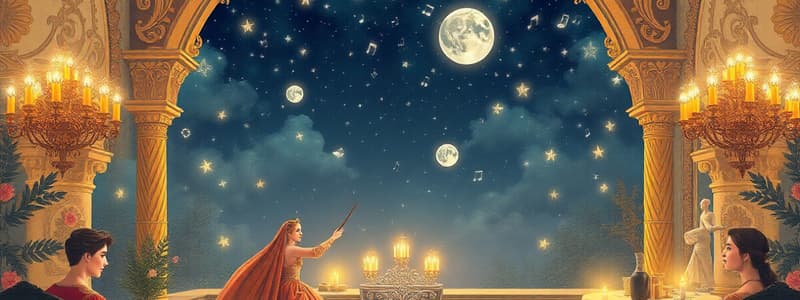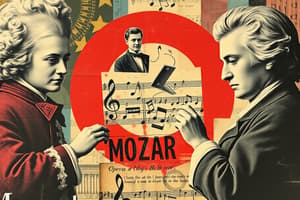Podcast
Questions and Answers
Which statement best describes Mozart's approach to opera composition?
Which statement best describes Mozart's approach to opera composition?
- He employed engaging storylines, blended various genres, and made his operas accessible to a broad audience. (correct)
- He emphasized grand orchestral arrangements and minimized the role of individual singers.
- He primarily focused on tragic themes with complex narratives aimed at elite audiences.
- He prioritized historical accuracy and traditional musical forms over innovation and entertainment.
What distinguishes 'The Magic Flute' from Mozart's other operas?
What distinguishes 'The Magic Flute' from Mozart's other operas?
- It focuses primarily on displaying vocal virtuosity rather than developing a strong narrative.
- It features spoken dialogue alongside singing and magical elements, which was unusual for his operas. (correct)
- It lacks a chorus and relies solely on the orchestra to establish the mood.
- It features the harpsichord playing a prominent role in the musical accompaniment.
What was a key difference between the harpsichord and the early piano?
What was a key difference between the harpsichord and the early piano?
- The harpsichord strings were plucked, which prevented varying the volume whereas the piano had hammers letting the player control the dynamics. (correct)
- The harpsichord had a wider range of notes than the early piano, allowing for more complex melodies.
- The harpsichord used metal strings for a brighter tone, while the piano utilized gut strings for a softer sound.
- The harpsichord was primarily used in the Classical period, while the piano was popular during the Baroque era.
Why was Maria Anna Mozart's musical career limited, despite her talent?
Why was Maria Anna Mozart's musical career limited, despite her talent?
What is Mozart primarily known for?
What is Mozart primarily known for?
What best describes Mozart's compositional style in his operas?
What best describes Mozart's compositional style in his operas?
Which opera depicts the consequences of a nobleman's immoral behavior?
Which opera depicts the consequences of a nobleman's immoral behavior?
What was Mozart's motivation for composing so many operas?
What was Mozart's motivation for composing so many operas?
In what way did Mozart contribute to the Classical period of music?
In what way did Mozart contribute to the Classical period of music?
Who wrote the text for Mozart's operas?
Who wrote the text for Mozart's operas?
Flashcards
Mozart
Mozart
A renowned composer of over 20 operas during the Classical period.
The Marriage of Figaro
The Marriage of Figaro
A comic opera about a count trying to seduce his wife's maid, composed in 1786.
The Magic Flute
The Magic Flute
A singspiel opera composed in 1791 involving a prince's quest aided by magical instruments.
Don Giovanni
Don Giovanni
Signup and view all the flashcards
Harpsichord
Harpsichord
Signup and view all the flashcards
Early Piano
Early Piano
Signup and view all the flashcards
Maria Anna Mozart
Maria Anna Mozart
Signup and view all the flashcards
Child Prodigy
Child Prodigy
Signup and view all the flashcards
Classical Period
Classical Period
Signup and view all the flashcards
Clever Narratives
Clever Narratives
Signup and view all the flashcards
Study Notes
Mozart's Operas
- Mozart's operas were very popular during the Classical period
- He composed over 20 operas
- He used clever narratives with main characters like noblemen
- He worked with librettists to create entertaining and charming operas
- He blended comedy, melodrama, and sometimes supernatural elements into his work
- He conducted many of the performances himself
Classical Brilliance
- Mozart was a child prodigy, composing music by age five
- He composed over 600 works during his relatively short life
- His works showed brilliance and entertained a wide audience
- Even today, he is considered one of the greatest composers of all time
The Marriage of Figaro
- A comic opera about a count trying to seduce his wife's chambermaid
- Completed in 1786
- Includes comedic elements, interwoven with a lot of music and drama
The Magic Flute
- Completed in 1791
- A "singspiel" opera, incorporating singing and spoken dialogue
- About a prince and his quest to rescue ladies
Don Giovanni
- A dramatic opera about the descent into hell of a badly behaved nobleman
- Completed in 1787
Harpsichord and Early Piano
- The harpsichord was a popular Baroque instrument, where plucking strings produced sound
- The early piano had strings hit by hammers, controlled by the player pressing the keys
- Maria Anna Mozart, Mozart's sister, was a talented harpsichord and piano player but wasn't allowed to pursue professional music as a woman. This was against the customs of the time.
Studying That Suits You
Use AI to generate personalized quizzes and flashcards to suit your learning preferences.




